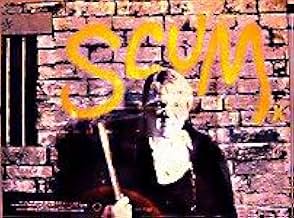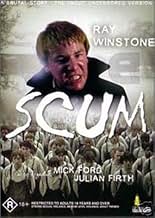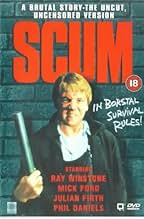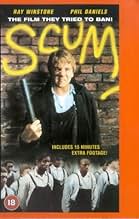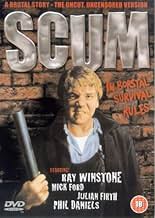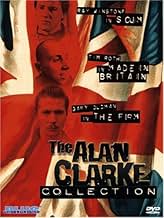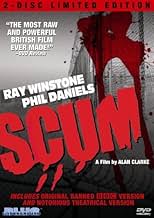ÉVALUATION IMDb
7,5/10
14 k
MA NOTE
Le récit sans concession de la vie dans un centre de détention pour mineurs britannique dans les années 70.Le récit sans concession de la vie dans un centre de détention pour mineurs britannique dans les années 70.Le récit sans concession de la vie dans un centre de détention pour mineurs britannique dans les années 70.
Philip DaCosta
- Jackson
- (as Philip Da Costa)
Avis en vedette
The story on which Scum is based was originally penned to be a part of a BBC series 'Play For Today' but was not shown at the time. It was made into a film two years later by Alan Clarke; and the reason it was not shown earlier is clear to see; as Scum is a shocking and unflinching account of life in Britain's now defunct Borstal system. The film is gritty and realistic and features no shortage of violence, so it's hardly a surprise that it didn't go down particularly well with Britain's conservative film censors. The film revolves around a young offender's institution in Britain. The place is shook up upon the arrival of a young man named Carlin. Carlin was moved from another institution for fighting with a guard, and arrives with his reputation already in front of him. He soon finds out how the prison works and quickly seeks to take out "the daddy" and his cronies to take control of the place himself.
Ray Winstone would go on to have a good career playing hard man types; and this is where it all started. The actor has a much younger look about him than the grizzled actor many will know better; but he still fits the bill well here and is always believable in his role. The film also features a number of faces that will be familiar to anyone who knows anything about British TV. Scum doesn't just rely on violence to deliver its shocks; the whole atmosphere of the central location is thoroughly grim and the guards' attitude towards the inmates does not inspire confidence in the system that the film is portraying. The film does not generally directly expose the flaws of the prison system; although this is given some attention by way of Mick Ford's Archer character; that cleverly condemns the system through dialogue. The story runs smoothly for the first two thirds of the film, while the final third is dedicated to the film's most shocking scenario; a sequence of events that is most likely, from anything in the film, to stay with the viewer once the film is over. Overall, this is an excellent little film that deserves to be viewed by anyone that considers themselves a fan of wayward cinema.
Ray Winstone would go on to have a good career playing hard man types; and this is where it all started. The actor has a much younger look about him than the grizzled actor many will know better; but he still fits the bill well here and is always believable in his role. The film also features a number of faces that will be familiar to anyone who knows anything about British TV. Scum doesn't just rely on violence to deliver its shocks; the whole atmosphere of the central location is thoroughly grim and the guards' attitude towards the inmates does not inspire confidence in the system that the film is portraying. The film does not generally directly expose the flaws of the prison system; although this is given some attention by way of Mick Ford's Archer character; that cleverly condemns the system through dialogue. The story runs smoothly for the first two thirds of the film, while the final third is dedicated to the film's most shocking scenario; a sequence of events that is most likely, from anything in the film, to stay with the viewer once the film is over. Overall, this is an excellent little film that deserves to be viewed by anyone that considers themselves a fan of wayward cinema.
Scum (the screenplay) was originally banned in 1977 - the year it was made - on the instructions of the BBC who had commissioned it. This was on the grounds of it being both too realistic in its presentation and simultaneously a work of fiction. The film follows the progression of three boys at borstal (prison for males ages 11-16) from arrival to the social dominance of one of them. It's a blackly humorous and scathing study of the (physical *and* mental) violence inherent in any social system, and particularly in the 'justice' system.
The screenplay was remade as a feature film in 1979, starring most of the original cast and featuring most of the original script, although a couple of scenes (featuring sexual abuse, though physical and racial abuse were deemed acceptable...) were presumably cut from the script because they wouldn't pass even the BBFC censor.
The original screenplay has subsequently been shown on UK television once. I happened to have the video running. With a high-quality tape in it. Lucky, that! It compares very favourably to the film, though the film format appears inferior (lower budget at the BBC), the quality of the performances is possibly better.
Scum is one of the most important screenplays to have been made, and shown, on British television, because it reveals the changing attitudes of the censors, and the nature of political censorship in the UK.
The film itself does not reveal this history.
The screenplay was remade as a feature film in 1979, starring most of the original cast and featuring most of the original script, although a couple of scenes (featuring sexual abuse, though physical and racial abuse were deemed acceptable...) were presumably cut from the script because they wouldn't pass even the BBFC censor.
The original screenplay has subsequently been shown on UK television once. I happened to have the video running. With a high-quality tape in it. Lucky, that! It compares very favourably to the film, though the film format appears inferior (lower budget at the BBC), the quality of the performances is possibly better.
Scum is one of the most important screenplays to have been made, and shown, on British television, because it reveals the changing attitudes of the censors, and the nature of political censorship in the UK.
The film itself does not reveal this history.
The grandaddy of 'incarceration' films - this is one of the best, oft copied but never bettered.
I liked it because it's so damn British. The one liners are legion; you all know what they are and where, but among a stellar list 'Mecca, Archer' rises just above and never fails to have me in fits. The way Goodyear looks at the Governor just after this great outburst is also revealing; as is the look of satisfaction on Archer's face when he finally succeeds in riling the 'religious maniac'.
Of course, there's a serious message in here; expedited best in the conversation between Archer and Mr Duke over 'coffee'. Analysing the situation, as Archer attempts to do, will simply not be tolerated and is interpreted as dissent by a man who embodies the 'system' and is intellectually and emotionally unequipped to deal with his own, and the State's ultimate failure to deliver.
Like true class acts, this film works on several levels; it's a no nonsense drama bedecked with Taj Mahal one liners everyone loves, yet it also works on a deeper level; you cannot punitively 'correct' all offenders with violence and cruelty. You are not corrected, you are merely broken, as Davis and Toyne are. If you're not broken, you run amok, but the point is you're not 'cured'.
When this film was on TV in 1983, just after Channel Four started broadcasting, they edited the notorious potting shed sequence to such an extent that the heinous act committed was virtually excised, thereby diluting the dramatic effect to virtually zero. Interestingly enough, they also edited out the bit where Mr Greaves ignores Davis' second press of the bell. Why? Presumably because they feared the ire of the State at the highlighting of its inadequacies? I suppose they can be forgiven, Channel Four was new then after all, but it's quite revealing nonetheless.
If I'm home alone, I quote this film as I'm wandering around the house. I don't quite know why. It's all about the importance of individuality, standing up for yourself and not just 'accepting' things. That's probably the reason. Now, where's your tool?
I liked it because it's so damn British. The one liners are legion; you all know what they are and where, but among a stellar list 'Mecca, Archer' rises just above and never fails to have me in fits. The way Goodyear looks at the Governor just after this great outburst is also revealing; as is the look of satisfaction on Archer's face when he finally succeeds in riling the 'religious maniac'.
Of course, there's a serious message in here; expedited best in the conversation between Archer and Mr Duke over 'coffee'. Analysing the situation, as Archer attempts to do, will simply not be tolerated and is interpreted as dissent by a man who embodies the 'system' and is intellectually and emotionally unequipped to deal with his own, and the State's ultimate failure to deliver.
Like true class acts, this film works on several levels; it's a no nonsense drama bedecked with Taj Mahal one liners everyone loves, yet it also works on a deeper level; you cannot punitively 'correct' all offenders with violence and cruelty. You are not corrected, you are merely broken, as Davis and Toyne are. If you're not broken, you run amok, but the point is you're not 'cured'.
When this film was on TV in 1983, just after Channel Four started broadcasting, they edited the notorious potting shed sequence to such an extent that the heinous act committed was virtually excised, thereby diluting the dramatic effect to virtually zero. Interestingly enough, they also edited out the bit where Mr Greaves ignores Davis' second press of the bell. Why? Presumably because they feared the ire of the State at the highlighting of its inadequacies? I suppose they can be forgiven, Channel Four was new then after all, but it's quite revealing nonetheless.
If I'm home alone, I quote this film as I'm wandering around the house. I don't quite know why. It's all about the importance of individuality, standing up for yourself and not just 'accepting' things. That's probably the reason. Now, where's your tool?
Scum is an unforgiving portrayal of both physical and psychological abuse of the British borstal system; 1 hour and 30 minutes. The movie explores the borstal's hierarchy, analyzing both the wardens and the inmates ' actions and responsibilities, asking who is the worst. As Carlin (Ray Winstone) joins the borstal, the hierarchy is shattered. Carlin says he's looking for' no trouble,' but he's just as pugnacious or even more skullduggerous than the others. Scum describes the angry resentment of inequality in' correctional' institutions, much like' Cool Hand Luke' or' One Flew Over The Cuckoo's Nest.' Personally, I find few things worse than power abuse, whether in an institution or in a family. I'm sure that many would agree with me on that, and then make Scum an engrossing, resonant, and uncomfortable watch for everyone. Archer's protagonist, an articulate and apparently committed vegetarian who's out to make life difficult for the screws, delivers fragments of Roy Minton's script that beautifully examine the process and the angry men who staff these institutions-" Even though you've spent your life in jail, you're still just a simple cop. Now, who's got the stick for that? Us. Who's paying for that every day. Scum achieves what it aims to accomplish through convincing performance and blunt realism: portraying the reprehensible conditions of terrorism, discrimination and bribery in these institutions. One might wonder if the movie exaggerated these circumstances, but in 1982 government abolished the borstal scheme, replacing it with' Youth Custody Centres.' I assume it speaks volumes for the reputation of Scum.
Alan Clarke first released Scum in 1977 as a BBC TV-film, yet the BBC disapproved of the film due to the amount of raw, harrowing realism which had been packed into a short running-time. Therefore the BBC banned the version, and it was not until fifteen years later that the TV-version was aired on the UK's Channel 4. Though, to get around not being able to release the TV version of Scum Alan Clarke opted in for developing a remade, feature-length version to be aired at cinemas, this was released in 1979. The film sent shockwaves through cinemas across Britain, causing huge controversy from the media, government and British public. Some people saw the film as a "visceral image of a flawed system", while others saw the film as "exploitive trash in the form of a documentary".
Scum is a disturbing look at a British Borstal's futile attempt at rehabilitating young offenders, the inmates of the Borstal range from adolescent teen to young adult. Most of them (if not all) have little hope in achieving anything in their life, except for just moving from prison to prison for their antisocial crimes. The film focuses of on brutality of a flawed and corrupt system whereby the inmates have no hope of rehabilitation due to the infantile regimes. The film shows how survival through brutality is the only way of getting through the system and even then there is still no sign of release for any of the prisoners. Thankfully in today's Britain, Borstals are inexistent, since they were (as is quite apparent in Scum) deemed unfit for people, due to the despicable infliction of violence and vicious corruption.
Scum is undoubtedly a film which will prompt viewers to question to entire rehabilitation process used for society's undesirables. Scum makes you wonder whether it is morally incorrect for even the most disgusting of individuals to get such vile treatment. As the brutal treatment is only prompting the individual to become even more sadistic and inhumane. The film details what men will do to "comply" with a system they loathe and how they will form their own rules and beliefs to suit the system in a way which will benefit them. There is a strong element of wasted talent etched into the film, this is in the respect of intelligent men who have potential, yet do not know how to use it. Scum takes you inside a world where young men have been reduced to their most primitive form; a place where violence breeds violence and respect is shown through class and power, rather than morals. I beg of you to think about what Scum is attempting to say and question through its subtext.
The performances from the entire cast are pulled off with raw, natural intensity. Ray Winstone's debut performance as nicknamed "the daddy"- Carlin is one of the most unflinching and uncompromising performances I have ever seen. It is a performance which bursts with adolescent rage and masochism. He is a boy who has been demoralised by the life he has grown up in. It is distressing to see a man of complex capabilities be destroyed by his primitive brutality, which has been forced upon him by the human instinct of survival.
The technical prowess of Scum helps to create and delve inside the bland, grim and unpleasant environment of the Borstal. Making the film feel even more genuine in its atmosphere through its documentary style editing and camera techniques, the use of long-haul, close-ups and tracking-shots add to the film's aggressive ingenuity. In some of the more violent scenes of the film the camera is held for longer takes, which helps to provoke more emotional power. The camera feels somewhat intrusive, this is because of how Alan Clarke is achieving to shed light on a conformity situation people were afraid to question and examine, yet Alan Clarke is unadulterated when it comes to presenting realism and so tries to make his film-making as tight as possible. There is no use of score either, nor any form of music to accompany scenes, making scenes feel all the more haunting and prolonged.
Scum is an engrossing, convincing and complex example of British film-making at the top of its game. It is a story you will never forget, and remains a film which contains scenes that once viewed will be etched into the depths of your mind. Scum should be compulsory viewing for everyone as it remains a highly affective film of searing emotional intensity.
Scum is a disturbing look at a British Borstal's futile attempt at rehabilitating young offenders, the inmates of the Borstal range from adolescent teen to young adult. Most of them (if not all) have little hope in achieving anything in their life, except for just moving from prison to prison for their antisocial crimes. The film focuses of on brutality of a flawed and corrupt system whereby the inmates have no hope of rehabilitation due to the infantile regimes. The film shows how survival through brutality is the only way of getting through the system and even then there is still no sign of release for any of the prisoners. Thankfully in today's Britain, Borstals are inexistent, since they were (as is quite apparent in Scum) deemed unfit for people, due to the despicable infliction of violence and vicious corruption.
Scum is undoubtedly a film which will prompt viewers to question to entire rehabilitation process used for society's undesirables. Scum makes you wonder whether it is morally incorrect for even the most disgusting of individuals to get such vile treatment. As the brutal treatment is only prompting the individual to become even more sadistic and inhumane. The film details what men will do to "comply" with a system they loathe and how they will form their own rules and beliefs to suit the system in a way which will benefit them. There is a strong element of wasted talent etched into the film, this is in the respect of intelligent men who have potential, yet do not know how to use it. Scum takes you inside a world where young men have been reduced to their most primitive form; a place where violence breeds violence and respect is shown through class and power, rather than morals. I beg of you to think about what Scum is attempting to say and question through its subtext.
The performances from the entire cast are pulled off with raw, natural intensity. Ray Winstone's debut performance as nicknamed "the daddy"- Carlin is one of the most unflinching and uncompromising performances I have ever seen. It is a performance which bursts with adolescent rage and masochism. He is a boy who has been demoralised by the life he has grown up in. It is distressing to see a man of complex capabilities be destroyed by his primitive brutality, which has been forced upon him by the human instinct of survival.
The technical prowess of Scum helps to create and delve inside the bland, grim and unpleasant environment of the Borstal. Making the film feel even more genuine in its atmosphere through its documentary style editing and camera techniques, the use of long-haul, close-ups and tracking-shots add to the film's aggressive ingenuity. In some of the more violent scenes of the film the camera is held for longer takes, which helps to provoke more emotional power. The camera feels somewhat intrusive, this is because of how Alan Clarke is achieving to shed light on a conformity situation people were afraid to question and examine, yet Alan Clarke is unadulterated when it comes to presenting realism and so tries to make his film-making as tight as possible. There is no use of score either, nor any form of music to accompany scenes, making scenes feel all the more haunting and prolonged.
Scum is an engrossing, convincing and complex example of British film-making at the top of its game. It is a story you will never forget, and remains a film which contains scenes that once viewed will be etched into the depths of your mind. Scum should be compulsory viewing for everyone as it remains a highly affective film of searing emotional intensity.
Le saviez-vous
- AnecdotesCarlin was originally a Glaswegian, but was changed into a Cockney when Alan Clarke saw a then-unknown Ray Winstone walk in a unique way.
- GaffesAll borstal inmates were subject to the same mandatory short-back-and-sides haircut, yet a vast array of hairstyles are shown throughout the film, including afros.
- Autres versionsNorwegian cinema version was cut in the rape scene and the suicide scene. Later video versions are uncut.
- ConnexionsFeatured in The South Bank Show: Keith Jarrett/Scum (1979)
- Bandes originalesDirty Last Night
(uncredited)
Music by John Dickson and Elfed Hayes
De Wolfe Music Ltd
Meilleurs choix
Connectez-vous pour évaluer et surveiller les recommandations personnalisées
- How long is Scum?Propulsé par Alexa
Détails
- Date de sortie
- Pays d’origine
- Site officiel
- Langue
- Aussi connu sous le nom de
- Scum más allá de la degradación
- Lieux de tournage
- sociétés de production
- Consultez plus de crédits d'entreprise sur IMDbPro
Box-office
- Budget
- 250 000 £ (estimation)
- Brut – États-Unis et Canada
- 6 461 $ US
- Fin de semaine d'ouverture – États-Unis et Canada
- 1 948 $ US
- 18 juin 2017
- Brut – à l'échelle mondiale
- 6 461 $ US
- Durée1 heure 38 minutes
- Mixage
- Rapport de forme
- 1.66 : 1
Contribuer à cette page
Suggérer une modification ou ajouter du contenu manquant



